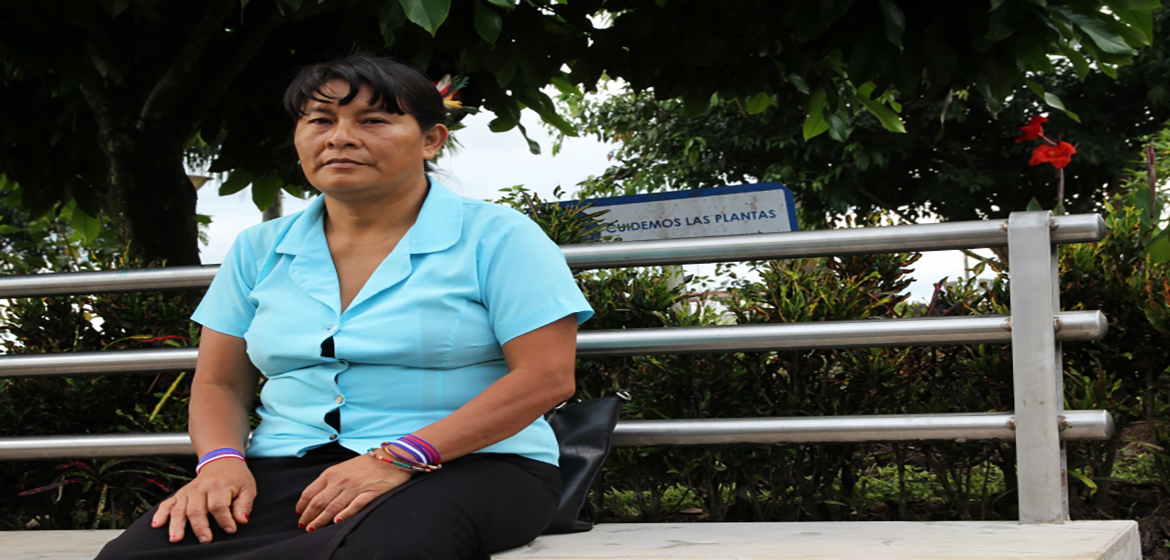Sustained demonstrations in Ecuador got the government to back down—at least for now.
By Kimberley Brown
PUYO, ECUADOR—Rosa Elvira Chuji Gualingai, 50, came to the city to pressure the government. Watching the traffic outside her office window, she says, “I can't get used to this lifestyle.” The indigenous activist, leader of the Shiwiar community of Kurintsa, was raised deep in the Amazon rainforest, surrounded by towering ceibo and palm trees. With no roads, the only way to travel is up to six days by boat or to charter a plane. With little electricity and no plumbing, the Shiwiar bathe in the nearby rivers and live mainly by hunting and fishing. But this way of life is under threat, as the Ecuadorian government sells rainforest land to oil companies.
The country’s well organized indigenous movement, however, has a history of giant slaying—it held demonstrations that helped overthrow presidents in and To protect the Amazon from the latest round of oil development, indigenous groups held rallies, closed down highways and marched for over two weeks from the rainforest to Quito, the capital. After months of protest, the government scaled back its plans—at least temporarily.
Ecuador’s partially nationalized oil industry has long helped the government and poverty relief. But with a global drop in oil prices, Ecuador’s much-needed from 12.1 to 5.4 percent of GDP between 2013 and 2016. The center-left President Lenin Moreno, elected in 2017, launched an ambitious campaign to recover lost income by expanding oil production in the Amazon. This included , each up to 2,000 square kilometers, of the Southeast oil fields, which encompass Kurintsa. It also included the development of , one of the most biodiverse regions of the planet and home to two uncontacted indigenous communities.
Indigenous groups rejected these plans, saying that leaks and waste have contaminated the soil and water in other regions of the Amazon, displacing indigenous communities who could no longer live off the land.
Environmentalists also argue roads built to enable oil production will increase deforestation, inviting destructive industries deeper into the region. A from the World Resources Institute and the Rights and Resources Initiative found that, because many indigenous groups live in carbon-storing forests, “strengthening the land and resource rights of indigenous peoples” is key to fighting climate change.
Representatives of the Amazon communities say Moreno never consulted them about his plans, a violation of Ecuador’s constitution and international law. This assertion is backed up by Victoria Tauli-Corpuz, UN special rapporteur on the rights of indigenous peoples, who
“Unless they change the path of development,” she says, “the threat to the forest is really serious.” She will deliver her final assessment and recommendations by September, but the UN has no enforcement mechanism.
Chuji, soft-spoken, but firm, is a member of the group Mujeres Amazonicas (Amazon Women), made up of indigenous women who live in the rainforest. In Chuji and more than 100 other Amazon women protested in front of the presidential palace for five days, demanding a meeting with Moreno and an immediate stop to all oil and mining activities in the rainforest.
On another occasion, Chuji says, she confronted the president herself. “He said, ‘I’ll see what I can do,’ and I said, ‘You will comply. If you don’t comply, we’ll be back,’” she says. “And we are going back.”
In November 2018, eight women from Mujeres Amazonicas walked into the office of the ministry of energy and nonrenewable natural resources and demanded a meeting with the minister, Carlos Perez. When they were told he was out of town, they occupied his office for the next 30 hours, waiting for him to return.
In December 2018, Perez to develop more oil fields in Yasuni National Park. The ministry already had decided to reduce the Southeast Oil auction down to two blocks, and is now debating whether to cancel it. Perez cited indigenous and environmentalist protests as a main reason. But he left the door open for the future, telling local media the plans were not necessarily abandoned.
Carlos Manzabanda, the Ecuador field coordinator for the advocacy group Amazon Watch, says Perez’s announcement should be taken “with caution.” The country is deeply in debt, mainly driven by the continued low price of oil, and has slashed social spending and canceled gasoline subsidies meant to help low-income families. The government is doing everything in its power not to anger people any further, says Manzabanda, and could reverse its decision when the country is more stable.
Chuji says she’s prepared. “I have been fighting since I was young,” she says, “and I will die doing this, fighting for my kids.”
Source:
Related to SDG 10: Reduced inequalities, SDG 13: Climate action and SDG 16: Peace, justice and strong institutions



